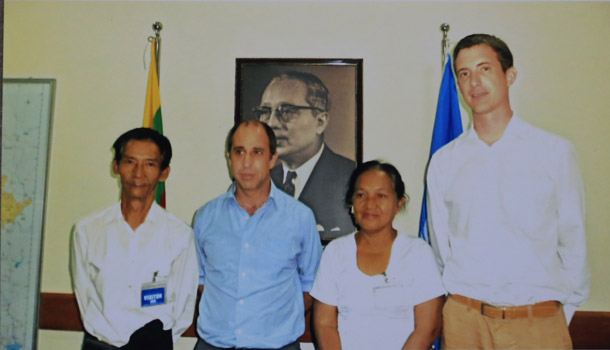RANGOON — The United Nations’ special rapporteur for human rights in Burma, Tomás Ojea Quintana, met on Tuesday with the parents of a girl gunned down by the Burmese military in a killing that brought the brutality of the 1988 pro-democracy crackdown to the eyes of the world.
The father of Win Maw Oo, the subject of an infamous photograph that appeared in the Oct. 3, 1988, issue of Newsweek magazine’s Asian edition documenting a blood-soaked 16-year-old girl being carried by two doctors, said he and his wife were invited to the UN Development Program’s office in Rangoon to meet with Quintana on Tuesday evening.
“Mr. Quintana said after reading a story about our daughter in The Irrawaddy magazine that he felt sad about our daughter,” the father Win Kyu said. “He also said he respects our daughter for her sacrifice at such a young age for democracy in Burma so that he wanted to see us.”
The Irrawaddy ran a story about Win Maw Oo under the headline “Why the Past Can’t Be Put to Rest” in its August issue.
A UNDP official confirmed the meeting but declined to comment further, saying he did not have permission to speak to the media.
Quintana is on an 11-day visit to assess the human rights situation in Burma.
During the one-hour meeting, the UN envoy asked the parents what happened to their daughter the day she was killed on Sept. 19, 1988; what they wanted to ask the government; and whether they had any plan to seek justice for their daughter’s death.
“We replied that we wanted to ask the government, not only for our daughter but for all the people who had sacrificed their lives then, to have some memorial place to honor those fallen during the uprising,” he said, adding that with regard to justice for his daughter, he did not wish to dwell on past wrongs.
Referring to a comment the father made in The Irrawaddy article—that “You cannot say democracy is now flourishing in our country”—Win Kyu said Quintana asked about the reason for his somewhat pessimistic assessment.
“Whenever journalists came to my house for interviews, plainclothes police appeared and asked me who they are and what they are doing,” he said. “So I told him that’s the best example of whether we are enjoying democracy or not.”
“Mr. Quintana said, ‘It shouldn’t be like that,’” Win Kyu recalled.
Win Kyu said the family was proud to have met with the UN envoy to share their daughter’s story.
“Our daughter has been somewhat forgotten for the last 24 years. Now Mr. Quintana met us and asked about our daughter with respect. We feel proud of our daughter. At the same time, we took our hats off to Mr. Quintana, too.”

















